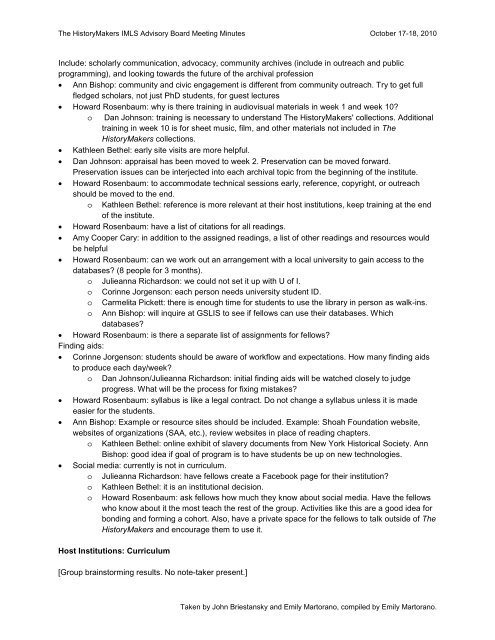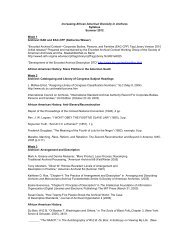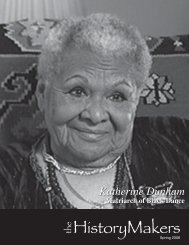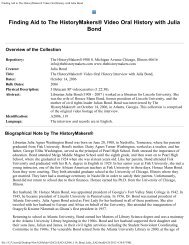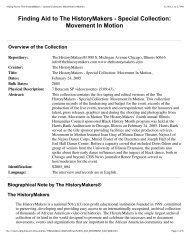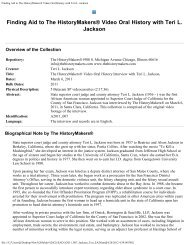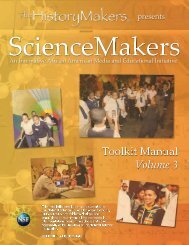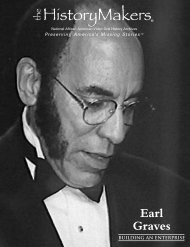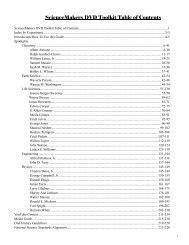Attachment B: Conference Call/Meeting Minutes - The History Makers
Attachment B: Conference Call/Meeting Minutes - The History Makers
Attachment B: Conference Call/Meeting Minutes - The History Makers
Create successful ePaper yourself
Turn your PDF publications into a flip-book with our unique Google optimized e-Paper software.
<strong>The</strong> <strong>History</strong><strong>Makers</strong> IMLS Advisory Board <strong>Meeting</strong> <strong>Minutes</strong> October 17-18, 2010Include: scholarly communication, advocacy, community archives (include in outreach and publicprogramming), and looking towards the future of the archival profession• Ann Bishop: community and civic engagement is different from community outreach. Try to get fullfledged scholars, not just PhD students, for guest lectures• Howard Rosenbaum: why is there training in audiovisual materials in week 1 and week 10?o Dan Johnson: training is necessary to understand <strong>The</strong> <strong>History</strong><strong>Makers</strong>' collections. Additionaltraining in week 10 is for sheet music, film, and other materials not included in <strong>The</strong><strong>History</strong><strong>Makers</strong> collections.• Kathleen Bethel: early site visits are more helpful.• Dan Johnson: appraisal has been moved to week 2. Preservation can be moved forward.Preservation issues can be interjected into each archival topic from the beginning of the institute.• Howard Rosenbaum: to accommodate technical sessions early, reference, copyright, or outreachshould be moved to the end.o Kathleen Bethel: reference is more relevant at their host institutions, keep training at the endof the institute.• Howard Rosenbaum: have a list of citations for all readings.• Amy Cooper Cary: in addition to the assigned readings, a list of other readings and resources wouldbe helpful• Howard Rosenbaum: can we work out an arrangement with a local university to gain access to thedatabases? (8 people for 3 months).o Julieanna Richardson: we could not set it up with U of I.o Corinne Jorgenson: each person needs university student ID.o Carmelita Pickett: there is enough time for students to use the library in person as walk-ins.o Ann Bishop: will inquire at GSLIS to see if fellows can use their databases. Whichdatabases?• Howard Rosenbaum: is there a separate list of assignments for fellows?Finding aids:• Corinne Jorgenson: students should be aware of workflow and expectations. How many finding aidsto produce each day/week?o Dan Johnson/Julieanna Richardson: initial finding aids will be watched closely to judgeprogress. What will be the process for fixing mistakes?• Howard Rosenbaum: syllabus is like a legal contract. Do not change a syllabus unless it is madeeasier for the students.• Ann Bishop: Example or resource sites should be included. Example: Shoah Foundation website,websites of organizations (SAA, etc.), review websites in place of reading chapters.o Kathleen Bethel: online exhibit of slavery documents from New York Historical Society. AnnBishop: good idea if goal of program is to have students be up on new technologies.• Social media: currently is not in curriculum.o Julieanna Richardson: have fellows create a Facebook page for their institution?o Kathleen Bethel: it is an institutional decision.o Howard Rosenbaum: ask fellows how much they know about social media. Have the fellowswho know about it the most teach the rest of the group. Activities like this are a good idea forbonding and forming a cohort. Also, have a private space for the fellows to talk outside of <strong>The</strong><strong>History</strong><strong>Makers</strong> and encourage them to use it.Host Institutions: Curriculum[Group brainstorming results. No note-taker present.]Taken by John Briestansky and Emily Martorano, compiled by Emily Martorano.


